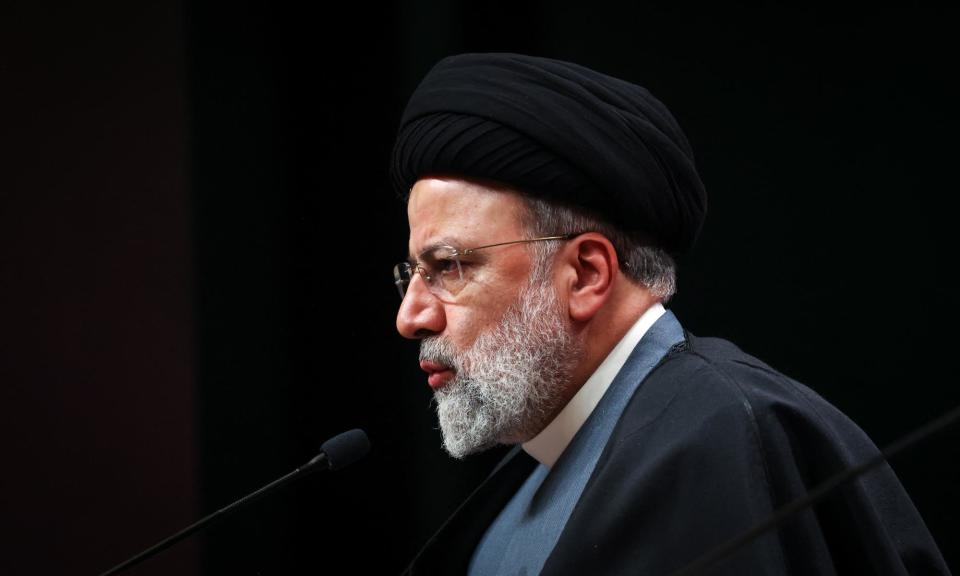Who was Ebrahim Raisi and what were his policies at home and abroad?

Ebrahim Raisi, the Iranian president who died in a helicopter crash on Sunday, was a hardliner who had been instrumental in the last few years in steering Iran back towards the more uncompromising beliefs of the Islamic Republic’s revolutionary founders.
A supporter of deeply conservative values on the domestic front, in terms of foreign policy, Raisi also carved out an increasingly aggressive stance, and it was on his watch that Tehran opted to launch its recent unprecedented missile and drone strike against Israel, bringing the two countries into direct and open conflict for the first time.
While he was elected president in June 2021, having represented himself as the best person to fight corruption and Iran’s economic problems, Raisi had long occupied important positions in Iran, including an alleged key role in the so-called Death Committee responsible for executing thousands of prisoners in the 1980s – a claim he denied.
Related: Ebrahim Raisi: what we know so far about Iranian president’s helicopter crash
Born in 1960 into a clerical family in Mashdad, Raisi was a child of the revolution that overthrew the Shah after he had travelled to Qom to attend a Shia seminary at the age of 15, following in his father’s footsteps.
While still a young student, he joined the mass protests against the western-backed Shah in 1979 that would lead to the Islamic Revolution under the guidance of Ayatollah Ruhollah Khomeini, a cleric until his dramatic return from exile in France.
In the turbulent first years of the Islamic Revolution, the young Raisi continued with his studies at the Shahid Motahari University in Tehran, where he received a doctorate in Islamic jurisprudence and law.
Joining the judiciary, Raisi, aged just 25 – like many other young men of his generation – would find himself catapulted into important office, in his case as the deputy prosecutor of Tehran.
It was while still in that role, say human rights groups, that he became one of four judges sitting on the infamous Death Committee, a secret tribunal set up in 1988 to retry thousands of prisoners, many of them members of the Mujahedin-e Khalq group.
It served as a springboard to his wider ambitions. Raisi would later serve as Tehran’s chief prosecutor, then as the head of the State Inspectorate Organisation. By 2006, he had been elected to the Assembly of Experts, which is charged with appointing and overseeing the supreme leader and whose members are approved by the powerful Guardian Council.
After the disputed 2009 presidential election triggered months of public protests, Raisi backed the brutal crackdowns and mass incarcerations. He became the country’s prosecutor general in 2014. He was placed under sanctions by the US Treasury in 2019 for his role in domestic repression.
Raisi’s election win, which led to him succeeding Hassan Rouhani as president, represented a pushback from Iran’s ultra-conservatives against the 2015 nuclear deal with world powers that gave Iran relief from international sanctions.
Under Raisi, Iran began to enrich uranium at nearly weapons-grade levels and obstructed international inspections.
Raisi’s first effort to displace Rouhani, in 2017, fell short, as Rouhani won 57% of the vote. His profile, however, was given a fresh boost when Ayatollah Ali Khamenei appointed him deputy chief of the Assembly of Experts in 2019.
Raisi won the 2021 presidential election, although that vote saw the lowest turnout in the Islamic Republic’s history.
In late 2022, a wave of nationwide protests erupted after the death in custody of Mahsa Amini, who had been arrested for allegedly breaching Iran’s strict Islamic dress code for women.
In March 2023, Iran and Saudi Arabia, longtime regional foes, announced a surprise deal that restored diplomatic relations.
The detente with Saudi Arabia, however, was something of an outlier in terms of Iranian foreign policy under Raisi. Iran supplied arms to Russia in its war on Ukraine, launched a massive drone and missile attack on Israel, and continued arming proxy groups in the Middle East, such as Yemen’s Houthi rebels and Lebanon’s Hezbollah.

 Yahoo Sport
Yahoo Sport 






































